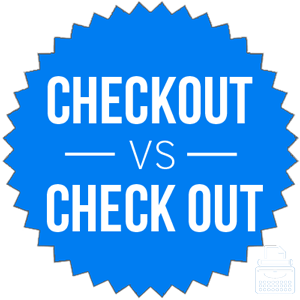Sometimes, it feels like we spend an inordinate amount of time shopping for things, like clothes, a new grill, or car insurance. Sometimes, to pay for these things, we need to stand in lines and have a cashier ring up our goods.
The place where this happens is called a checkout line. Or is it a check out line?
These phrases may seem superficially identical, but in reality, there are separate situations where a writer would use each one.
What is the Difference Between Checkout and Check Out?
In this post, I will compare check out vs checkout. I will use each spelling in at least one example sentence, so you can see it in context.
Plus, I will show you a helpful memory tool that will make choosing check out or checkout a bit easier.
When to Use Checkout
 What does checkout mean? Checkout can be a noun or an adjective.
What does checkout mean? Checkout can be a noun or an adjective.
When used as a noun, checkout means a final departure from a hotel or the cashier’s line at a supermarket.
For example,
- A sign on the door of each room reminded the hotel’s guests that checkout was at 11am each morning.
- “I hate coming to this store,” said Carla, “there is always a long line for the checkout.”
When used as an adjective, checkout describes the nature of the nouns above. For instance, a checkout time is when a guest leaves a hotel (opposite of a check-in time), and a checkout line is the queue for buying groceries in a supermarket. I have included more examples below for reference.
- When I got to the checkout counter, the cashier smiled and asked me if I had a membership card at the store.
- Checkout time was at 10am for our hotel, but we were long gone by 830 to catch our flight.
- com Inc. unveiled technology that will let shoppers grab groceries without having to scan and pay for them — in one stroke eliminating the checkout line. –Bloomberg
Occasionally, you will see checkout spelled as check-out when functionaing as an adjective. This practice is rare, and most style guides call for checkout to be spelled as one, unhyphenated word when functioning as an adjective.
The AP Stylebook, for instance, says,
- checkout (n. and adj.)
- check out (v.)
When to Use Check Out
 What does check out mean? Check out is a verb phrase. To check something out means to sign for its possession before taking it with you, like books at a library, or to purchase goods at a grocery store, like produce in the express checkout line.
What does check out mean? Check out is a verb phrase. To check something out means to sign for its possession before taking it with you, like books at a library, or to purchase goods at a grocery store, like produce in the express checkout line.
You can also sandwich nouns into the phrase, like check books out of the library.
For example,
- “I’m going to check out; meet me at the front of the store when you’re done being silly,” Carol told her son.
- I tried to check out a book from the library, but I had too many overdue fees and had to pay them first.
Check out can also mean to appraise something or to leave, either literally or figuratively.
- “Hey man, have you checked out Dave’s new pontoon boat? We can have lake parties every weekend now!” (appraise something)
- President Obama has emotionally checked out of his job a couple of years early, it seems. –The Telegraph (to leave, figuratively)
The reason check out as a verb phrase must be spelled as two separate words is because it can change tenses. Unlike checkout, which never changes, check out can be conjugated (because it’s a verb)
- Checkout = Noun (never changes)
- Check out = Verb
- Checked out = Verb
- Checking out = Verb
Trick to Remember the Difference
 These two spellings are confusing, since they are identical except for being for the space separating them.
These two spellings are confusing, since they are identical except for being for the space separating them.
Remember that the individual word check can also be a verb. As long as you can remember what the individual parts of the phrase check out mean, you will have little trouble using it as a verb phrase.
Summary
Is it checkout or check out? The usage of these terms never overlaps, so it is important to remember the difference.
- Check out is a verb phrase that means to sign for something or to observe something.
- Checkout means a place to buy things or the process of leaving a hotel as a noun, and it describes qualities of these things as an adjective.
Contents
